Related Research Articles
The history of Egypt has been long and wealthy, due to the flow of the Nile River with its fertile banks and delta, as well as the accomplishments of Egypt's native inhabitants and outside influence. Much of Egypt's ancient history was unknown until Egyptian hieroglyphs were deciphered with the discovery and deciphering of the Rosetta Stone. Among the Seven Wonders of the Ancient World is the Great Pyramid of Giza.

The United Arab Republic was a sovereign state in the Middle East from 1958 until 1961. It was initially a short-lived political union between Egypt and Syria from 1958 until Syria seceded from the union following the 1961 Syrian coup d'état. Egypt continued to be known officially as the United Arab Republic until it was formally dissolved by Anwar Sadat in September 1971.

Gamal Abdel Nasser Hussein was an Egyptian military officer and politician who served as the second president of Egypt from 1954 until his death in 1970. Nasser led the Egyptian revolution of 1952 and introduced far-reaching land reforms the following year. Following a 1954 attempt on his life by a Muslim Brotherhood member, he cracked down on the organization, put President Mohamed Naguib under house arrest and assumed executive office. He was formally elected president in June 1956.

The president of the Arab Republic of Egypt is the executive head of state of Egypt and the de facto appointer of the official head of government under the Egyptian Constitution of 2014. Under the various iterations of the Constitution of Egypt following the Egyptian Revolution of 1952, the president is also the supreme commander of the Armed Forces, and head of the executive branch of the Egyptian government.
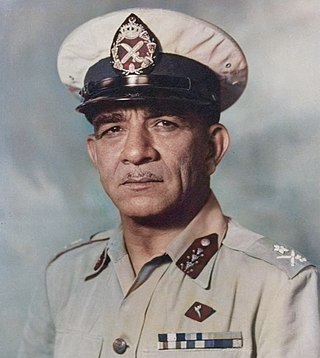
Major General Mohamed Bey Naguib Youssef Qutb El-Qashlan, known simply as Mohamed Naguib, was an Egyptian military officer and revolutionary who, along with Gamal Abdel Nasser, was one of the two principal leaders of the Free Officers movement of 1952 that toppled the monarchy of Egypt and the Sudan, leading to the establishment of the Republic of Egypt.
According to most scholars the history of modern Egypt dates from the start of the rule of Muhammad Ali in 1805 and his launching of Egypt's modernization project that involved building a new army and suggesting a new map for the country, though the definition of Egypt's modern history has varied in accordance with different definitions of modernity. Some scholars date it as far back as 1516 with the Ottomans' defeat of the Mamlūks in 1516–17.
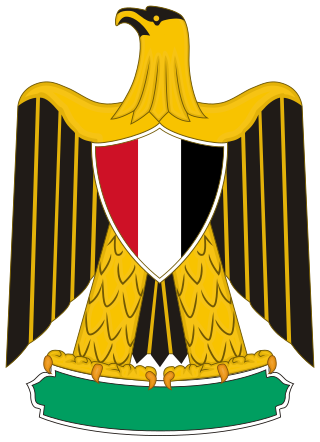
Nasserism is an Arab nationalist and Arab socialist political ideology based on the thinking of Gamal Abdel Nasser, one of the two principal leaders of the Egyptian Revolution of 1952, and Egypt's second President. Spanning the domestic and international spheres, it combines elements of Arab socialism, republicanism, secularism, nationalism, anti-imperialism, developing world solidarity, Pan-Arabism, and international non-alignment. According to Mohamed Hassanein Heikal, Nasserism symbolised "the direction of liberation, socialist transformation, the people’s control of their own resources, and the democracy of the peoples working forces."
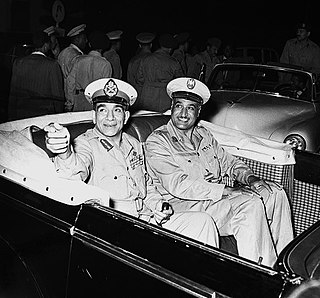
The Egyptian revolution of 1952, also known as the 1952 coup d'état and 23 July Revolution, was a period of profound political, economic, and societal change in Egypt. On 23 July 1952 the revolution began with the toppling of King Farouk in a coup d'état by the Free Officers Movement. This group of army officers was led by Mohamed Naguib and Gamal Abdel Nasser. The Revolution ushered in a wave of revolutionary politics in the Arab World, and contributed to the escalation of decolonisation, and the development of Third World solidarity during the Cold War.
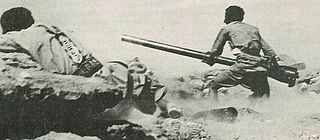
The North Yemen Civil War, also known as the 26 September Revolution, was a civil war fought in North Yemen from 1962 to 1970 between partisans of the Mutawakkilite Kingdom and supporters of the Yemen Arab Republic. The war began with a coup d'état carried out in 1962 by revolutionary republicans led by the army under the command of Abdullah as-Sallal. He dethroned the newly crowned King and Imam Muhammad al-Badr and declared Yemen a republic under his presidency. His government abolished slavery in Yemen. The Imam escaped to the Saudi Arabian border where he rallied popular support from northern Zaydi tribes to retake power, and the conflict rapidly escalated to a full-scale civil war.
The Revolutionary Command Council was the body established to supervise the Republic of Egypt and Anglo-Egyptian Sudan after the Revolution of 1952. It initially selected Ali Maher Pasha as Prime Minister, but forced him to resign after conflict over land reform. At that time, the Council took full control of Egypt. The RCC controlled the state until 1954, when the Council dissolved itself.

Air Marshal Ahmed Mohamed Shafik Zaki is an Egyptian politician and former presidential candidate. He was a senior commander in the Egyptian Air Force and later served as Prime Minister of Egypt from 29 January 2011 to 3 March 2011 under Hosni Mubarak.

Zakaria Mohieddin was an Egyptian military officer, politician, Prime Minister of Egypt and head of the first Intelligence body in Egypt, the Egyptian General Intelligence Directorate.
The History of Republican Egypt spans the period of modern Egyptian history from the Egyptian Revolution of 1952 to the present day, which saw the toppling of the monarchy of Egypt and Sudan, the establishment of a presidential republic, and a period of profound economic, and political change in Egypt, and throughout the Arab world. The abolition of a monarchy and aristocracy viewed widely as sympathetic to Western interests, particularly since the ousting of Khedive Isma'il Pasha, over seven decades earlier, helped strengthen the authentically Egyptian character of the republic in the eyes of its supporters.

Gamal Salem was an Egyptian military officer and prominent member of the Egyptian Free Officers who led the Egyptian Revolution of 1952 that toppled the monarchy of Egypt and Sudan. Prior to the Revolution, he served as an officer in the Royal Egyptian Air Force.

Khaled Mohieddine was an Egyptian military officer, revolutionary and politician. As a member of the Free Officers Movement, he participated in the toppling of King Farouk that began the Egyptian Revolution of 1952, and led to the establishment of the Republic of Egypt.
The Arab Cold War was a political rivalry in the Arab world from the early 1950s to the late 1970s and a part of the wider Cold War. It is generally accepted that the beginning of the Arab Cold War is marked by the Egyptian revolution of 1952, which led to Gamal Abdel Nasser becoming president of Egypt in 1956. Thereafter, newly formed Arab republics, inspired by revolutionary secular nationalism and Nasser's Egypt, engaged in political rivalries with conservative traditionalist Arab monarchies, influenced by Saudi Arabia. The Iranian Revolution of 1979, and the ascension of Ayatollah Ruhollah Khomeini as leader of Iran, is widely seen as the end of this period of internal conflicts and rivalry. A new era of Arab-Iranian tensions followed, overshadowing the bitterness of intra-Arab strife.

The 2011 Egyptian revolution, also known as the 25 January Revolution, began on 25 January 2011 and spread across Egypt. The date was set by various youth groups to coincide with the annual Egyptian "Police holiday" as a statement against increasing police brutality during the last few years of Hosni Mubarak's presidency. It consisted of demonstrations, marches, occupations of plazas, non-violent civil resistance, acts of civil disobedience and strikes. Millions of protesters from a range of socio-economic and religious backgrounds demanded the overthrow of Egyptian President Hosni Mubarak. Violent clashes between security forces and protesters resulted in at least 846 people killed and over 6,000 injured. Protesters retaliated by burning over 90 police stations across the country.

The history of Egypt under Gamal Abdel Nasser covers the period of Egyptian history from the Egyptian Revolution of 1952, of which Gamal Abdel Nasser was one of the two principal leaders, spanning Nasser's presidency of Egypt from 1956 to his death in 1970. Nasser's tenure as Egypt's leader heralded a new period of modernisation and socialist reform in Egypt, along with a staunch advocacy of pan-Arab nationalism, and developing world solidarity. His prestige in Egypt and throughout the Arab World soared in the wake of his nationalisation of the Suez Canal Company in 1956, and Egypt's political victory in the subsequent Suez Crisis, but was damaged badly by Israel's victory in the Six-Day War.

Arab socialism is a political ideology based on the combination of pan-Arabism and socialism. The term "Arab socialism" was coined by Michel Aflaq, the principal founder of Ba'athism and the Arab Socialist Ba'ath Party in Syria, in order to distinguish his version of socialist ideology from the international socialist movement. While distinct from the much broader tradition of socialist thought in the Arab world, which predates Arab socialism by as much as fifty years, direct influence and evolutions of his thought, Marxist or otherwise, were realized and expanded upon in countries like Syria, Egypt, Iraq and others. A main innovation of Aflaq's thought was the transformation of Arab unity from an intellectual ideal into a real-world political pursuit of rights alongside a new set of socio-economic conditions. Gamal Abdel Nasser's Egypt in particular served as a potent vehicle for Aflaq's thought, and would have to grapple with crises in the intellectual and military spheres.
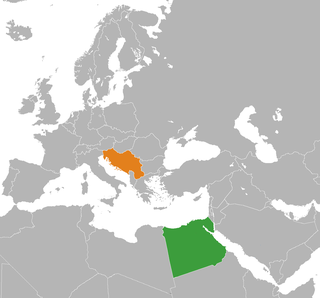
Egypt–Yugoslavia relations were historical foreign relations between Egypt and now break-up Yugoslavia. Both countries were founding members and prominent participants of the Non-Aligned Movement. While initially marginal, relations between the two Mediterranean countries developed significantly in the aftermath of the Soviet-Yugoslav split of 1948 and the Egyptian revolution of 1952. Belgrade hosted the Non-Aligned movement's first conference for which preparatory meeting took place in Cairo, while Cairo hosted the second conference. While critical of certain aspects of the Camp David Accords Yugoslavia remained major advocate for Egyptian realist approach within the movement, and strongly opposed harsh criticism of Cairo or proposals which questioned country's place within the movement.
References
- ↑ "The student movement in Egypt over the last century". The Middle East Monitor. October 21, 2014.
- ↑ "Egypt's hidden history of dissent". The New Arab. 25 January 2015.
- ↑ "Africa's 1968: Protests and Uprisings Across the Continent". Verso. 12 June 2018.
